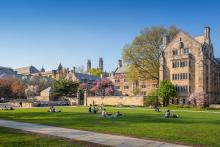As [Jesus] came near and saw the city, he wept over it, saying, "If you, even you, had only recognized on this day the things that make for peace!" —Luke 19:41
Economic Justice

To borrow a term from social movement theory, universities can be "movement halfway houses" that educate leaders for social justice. Higher education institutions have trained and nurtured numerous social movements and activists that have changed our world. The Student Nonviolent Coordinating Committee, which played a key role in the civil rights movement, came from a coalition of college students. Northern college students infused Freedom Summer's voter registration drives. More recently, student networks have rapidly expanded protests of corporate globalization and the U.S. Army's School of the Americas. Anti-sweatshop and living wage movements also are building momentum because of students.
These movements emerge, in part, because university faculty and staff are part of the conscientizing process of young people. Universities emphasize systemic analysis of social problems. They prize critical thinking skills. They encourage creative use of language and symbols. Combine these skills with higher education's focus on developing leaders, and we can see the potential of the universities to produce multiple generations of justice seekers.
We find the summons in our institutions' mission statements, the statements that no student, faculty, or staff ever really reads. But it's there, the call to moral learning and social justice. At some schools, the commitment is explicit: "Loyola Marymount understands and declares its purpose to be: the encouragement of learning, the education of the whole person, the service of faith, and the promotion of justice." At others, the call is embedded in an understanding of the proper use of knowledge: "Emory's mission lies in two essential, interwoven purposes: through teaching, to help men and women fully develop their intellectual, aesthetic, and moral capacities; and, through the quest for new knowledge and public service, to improve human well-being."
Universities experience enormous pressure to deliver a marketable product. But higher education is called to be more than a conduit for career-making. Our students are more than clients. Classically, education was meant for the whole person—for "full human flourishing." As University of Chicago professor Martha Nussbaum notes, U.S. higher education has been devoted particularly to the "cultivation of the whole human being for the functions of citizenship and life generally." At the core, universities are more than service providers with privileged clients. We are moral actors shaping the character and justice of society.
BUT EDUCATING change agents for social justice is not the same as encouraging increased volunteerism on campus, which is embraced much more easily by institutions and a broad political spectrum.

Architecture students at Alabama's Rural Studio raise shelters for the spirit.
For those who care about poverty in America, the coming months are a critical time, a turning point similar to the New Deal of the 1930s or the War on Poverty in the 1960s.
'Easy' solutions like standardized testing won't solve enduring problems like economic inequality.
Leading Venezuelan educators and critics of President Hugo Chavez are calling his creation of 500 schools constructed and supervised by the military a political program for "ideological indoctrin
Grameen Bank operates beyond the bottom line to benefit those at the bottom of the line.
Let the good times roll! President Bill Clinton was absolutely beaming as he reported the U.S. Census Bureau's annual poverty statistics.